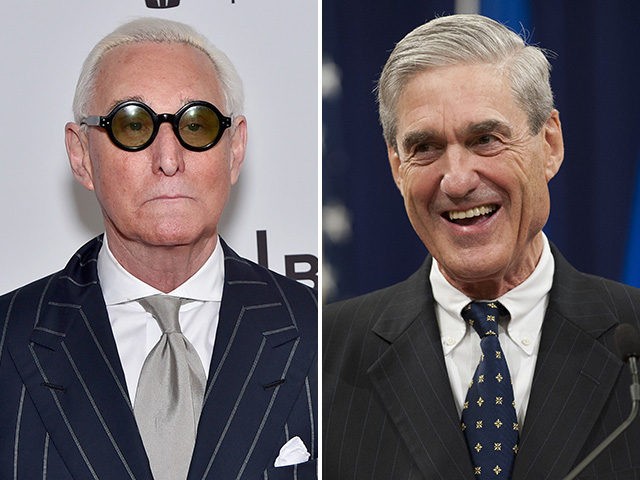Roger Stone Indictment Uses Russia ‘Hack’ Conclusions from Google-Linked Company
by Aaron Klein, Breitbart:
 Special Counsel Robert S. Mueller opens his office’s indictment of Roger Stone, a former associate of President Donald Trump, by citing information that relies on an outside company’s independent assessment that Russia hacked the servers of the Democratic National Committee (DNC).
Special Counsel Robert S. Mueller opens his office’s indictment of Roger Stone, a former associate of President Donald Trump, by citing information that relies on an outside company’s independent assessment that Russia hacked the servers of the Democratic National Committee (DNC).
The indictment immediately implies that WikiLeaks released emails stolen by Russians who allegedly hacked the DNC servers, going on to document alleged communication between Stone and WikiLeaks in part using intermediaries.
The indictment does not charge Stone with any attempts to collude with WikiLeaks or Russia, instead charging him with witness tampering, obstructing an official proceeding and making false statements to investigators and to the House intelligence committee.
The DNC famously refused to allow the FBI to access its server to verify the allegation that Russia carried out a hack during the 2016 presidential campaign. Instead, the DNC reached an arrangement with the FBI in which a third party company, CrowdStrike, conducted forensics on the server and shared details with the FBI.
As this reporter previously documented, CrowdStrike was financed to the tune of $100 million from a funding drive by Google Capital.
Google Capital, which now goes by the name of CapitalG, is an arm of Alphabet Inc., Google’s parent company. Eric Schmidt, the chairman of Alphabet, has been a staunch and active supporter of Hillary Clinton and is a longtime donor to the Democratic Party.
It was previously reported that Perkins Coie, the law firm that represented the DNC and Clinton’s campaign, helped draft CrowdStrike to aid with the DNC’s allegedly hacked server.
On behalf of the DNC and Clinton’s campaign, Perkins Coie also paid the controversial Fusion GPS firm to produce the infamous, largely-discredited anti-Trump dossier compiled by former British spy Christopher Steele.
Mueller’s indictment of Stone begins with an “introduction” section that sets the tone of the 23-page document. That section starts with the alleged hack of the DNC and references conclusions about Russia made by CrowdStrike.
The indictment states:
- By in or around May 2016, the Democratic National Committee (“DNC”) and the Democratic Congressional Campaign Committee (“DCCC”) became aware that their computer systems had been compromised by unauthorized intrusions and hired a security company (“Company 1”) to identify the extent of the intrusions.
“Company 1” clearly refers to CrowdStrike.
The charge document continues:
2. On or about June 14, 2016, the DNC—through Company 1—publicly announced that it had been hacked by Russian government actors.
3. From in or around July 2016 through in or around November 2016, an organization (“Organization 1”), which had previously posted documents stolen by others from U.S. persons, entities, and the U.S. government, released tens of thousands of documents stolen from the DNC and the personal email account of the chairman of the U.S. presidential campaign of Hillary Clinton (“Clinton Campaign”).
“Organization 1” refers to WikiLeaks.
In June 2016, The Washington Post reported on the Perkins Coie law firm’s involvement in bringing in CrowdStrike to investigate the DNC’s allegedly hacked server.
The Washington Post documented how Michael Sussmann, a partner with Perkins Coie who also represented the DNC, contacted CrowdStrike after the DNC suspected its server had been hacked. CrowdStrike then identified hacker groups allegedly tied to Russia.
The Post reported that Sussman called in Shawn Henry, president of CrowdStrike.
The Post reported:
DNC leaders were tipped to the hack in late April. Chief executive Amy Dacey got a call from her operations chief saying that their information technology team had noticed some unusual network activity. “It’s never a call any executive wants to get, but the IT team knew something was awry,” Dacey said. And they knew it was serious enough that they wanted experts to investigate.
That evening, she spoke with Michael Sussmann, a DNC lawyer who is a partner with Perkins Coie in Washington. Soon after, Sussmann, a former federal prosecutor who handled computer crime cases, called Henry, whom he has known for many years.
Within 24 hours, CrowdStrike had installed software on the DNC’s computers so that it could analyze data that could indicate who had gained access, when and how.
According to the Post, citing DNC officials, the “hackers” had “gained access to the entire database of opposition research on GOP presidential candidate Donald Trump.”
In testimony before the Senate Intelligence Committee in January 2017, then-FBI Director James Comey confirmed that the FBI registered “multiple requests at different levels,” to review the DNC’s hacked servers. Ultimately, the DNC and FBI came to an agreement in which a “highly respected private company”—a reference to CrowdStrike—would carry out forensics on the servers and share any information that it discovered with the FBI, Comey testified.
A senior law enforcement official stressed the importance of the FBI gaining direct access to the servers, a request that was denied by the DNC.
“The FBI repeatedly stressed to DNC officials the necessity of obtaining direct access to servers and data, only to be rebuffed until well after the initial compromise had been mitigated,” the official was quoted by the news media as saying.
“This left the FBI no choice but to rely upon a third party for information. These actions caused significant delays and inhibited the FBI from addressing the intrusion earlier,” the official continued.
Loading...



